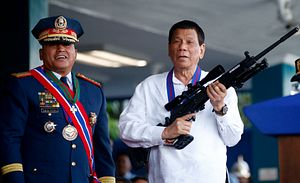Editor’s Note: The following is a preview of the latest edition of the APAC Risk Newsletter, presented by Diplomat Risk Intelligence. To read the full newsletter, click here to subscribe for free.
On Tuesday, February 11, the government of the Philippines formally gave notice to the U.S. Department of State that it intended to begin the process of terminating the 1998 U.S.-Philippines Visiting Forces Agreement (VFA), a status of forces agreement that governs the presence of U.S. troops on Philippine soil. The decision sparked a 180-day process at the end of which the agreement will no longer apply. The decision, born of Philippine President Rodrigo Duterte’s longstanding anti-Americanism, injects considerable uncertainty into the alliance (which will remain in place, as the 1951 Mutual Defense Treaty will be unaffected) and has the potential to upend the U.S. position in the Indo-Pacific.
My colleague Prashanth Parameswaran, The Diplomat’s resident Southeast Asia expert, took a longer look at the implications and origins of the Philippine decision. As he writes, the decision will complicate things for both Washington and Manila:
The VFA’s termination also creates complexities for both the United States and the Philippines respectively. For Washington, while alliance management has never been an easy affair, this would constitute the biggest blow to any of its treaty alliance relationships in Asia since the end of the Cold War, at precisely the time when the United States is trying to refocus itself on geopolitical competition with major powers, principally China and Russia. For Manila, this would degrade a significant source of security that it has continued to rely on even as its military capabilities remain limited and the threat posed by China remains real in spite of Duterte’s much-ballyhooed charm offensive to Beijing.
Prashanth and I dedicated an episode of the Asia Geopolitics podcast to discussing the implications of the VFA decision and what exactly might happen in the 180 day period. It’s worth recalling that many of Duterte’s deputies themselves had argued against terminating the agreement and that the Philippines, despite Duterte’s feelings, remains one of the world’s most pro-American countries in general.
Some have made the case that the decision is an attempt by Manila to favorably renegotiate the VFA to extract concessions from the United States or to assert sovereignty for political ends, but there’s no indicator that Duterte intends to back off. As has been public knowledge for years, the Philippine president is inherently skeptical of the United States. (The specific trigger for Duterte’s move appears to have been sparked by the U.S. decision to cancel a visa for Ronald dela Rosa, a Duterte ally and controversial law enforcement official).
The U.S.-Philippine alliance has been through its ups and downs. In 1991, U.S. troops were evicted from the country, only to return in the late 1990s on a rotational basis after the VFA was concluded. The problem now, however, is that Asia’s security environment—and even the Philippines’ internal security environment—is deeply in flux, presenting several challenges to Manila and Washington alike (Jay Batongbacal has a nice summary of these issues in a recent piece on the VFA decision for the Lowy Interpreter). As the 2017 siege of Marawi City demonstrated, the Armed Forces of the Philippines can benefit greatly from U.S. assistance in counterinsurgency campaigns.
What happens from here remains unclear—not only in terms of the fate of the VFA itself, but for the Philippines’ geopolitical position. Duterte has mentioned the possibility of deepening military cooperation with other countries, including China and Russia, both of which have been actively reaching out to the U.S.-skeptical leader since his 2016 inauguration. The White House, meanwhile, is not treating the Philippine decision with urgency. Alliance skeptic President Trump brushed off Duterte’s move, saying that the end of the VFA would likely end up saving the U.S. money.
Bottom Line: A decision by Philippine President Rodrigo Duterte to end a two-decade old agreement that underlies the ability of the U.S. military to operate in the country could be a significant transformation to the longstanding alliance at a time of regional uncertainty.
To read the entirety of the latest edition of the APAC Risk Newsletter, presented by Diplomat Risk Intelligence, click here to read and subscribe for free.

































